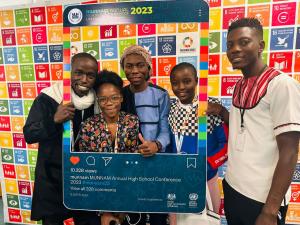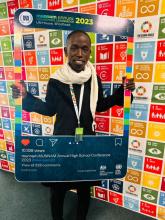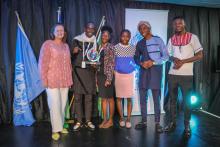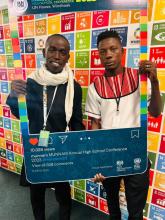Espoir’s journey to Model United Nations: A story of hope and resilience
Over 100 million people worldwide have been forced to flee their home countries due to conflict, violence, and persecution.
One such individual is 19- year old Espoir Safari who left his country of birth, the Democratic Republic of Congo (DRC), in hope of a better future. He arrived in Namibia in April 2021 and has been living at the Osire Refugee Camp in Otjozondjupa region.
Safari and three schoolmates from Osire Refugee Camp Secondary School participated in the Model United Nations (MUNNAM) simulations for the first time at UN Namibia headquarters in Windhoek.
Model UN is an innovative educational programme that engages high school learners in exploring international matters by taking on the role of diplomats and thus gaining first-hand experience in international relations and diplomacy.
MUNNAM simulations were hosted by UNIC Windhoek, World Health Organization Namibia, British High Commission, and Ministry of Education, Arts and Culture on November 1-2.
This year, 100 learners from schools in Windhoek and Osire Secondary School gathered to discuss the rising burden of pandemics and pandemics on public health systems.
The four learners, along with their teacher, Ethingo, drove from the refugee camp situated about 200 kilometres north of Windhoek at 4 AM to participate in the global health debate.
The journey to Windhoek was not without challenges, as the team’s vehicle broke down thrice en route to Windhoek. This mishap did not discourage the learners from participating in the Model UN Namibia deliberations despite being two hours late on the first day of the conference.
“It was important for our learners to participate in this conference because they are usually locked out from society,” said Ethingo. The high-level MUNNAM conference was an opportunity of a lifetime for Osire Secondary School given the scarcity of resources, Ethingo explained.
The school did not have sufficient funds to send their learners to the MUN conference, leaving Ethingo with two choices - to use his personal resources to ensure the learners participate or to turn a blind eye and let this opportunity go by.
“The school provided us with money to come for the MUNNAM training. But that is all we could afford as a school. So, I sacrificed the money I had to ensure their participation in the actual conference because I want them to have exposure to the outside world,” Ethingo explained.
The learners at the refugee camp are talented but they do not have the resources or support to invest in their education or personal development, lamented Ethingo.
“They are not allowed to leave the Osire Refugee Camp,” added Ethingo. This is why MUNNAM was an opportunity of a lifetime, added Safari who is in Grade 10. By participating in MUN learners develop and improve on skills such as research, public speaking, writing, negotiation, and problem solving.
Model UN offers significant pedagogic value by providing students with a unique platform to apply and hone a wide range of skills, noted Mzingisi Gqwede, the Director of Adult Education in the Ministry of Education, Arts and Culture.
“These extracurricular activities create a stimulating environment where intellectual exchange of ideas take centre stage, allowing participants to develop critical thinking, public speaking, negotiation and diplomacy skills,” said Gqwede who spoke during the MUNNAM opening ceremony.
Despite not getting a chance to present his position paper or pass a resolution at the MUNNAM conference, Safari was still able to contribute to discussions. Importantly, he learned so much about the socio-economic and health status of his assigned country, Vietnam.
“I was not able to present some of the work that I had prepared individually because we were late but taking part in this UN simulations conference was still a very enriching experience,” admitted Safari.
Safari, who is originally from the Democratic Republic of Congo (DRC) came to Namibia in April 2021. “Osire is a rural setting and we are not very exposed. That is what made this a great networking opportunity,” said Safari, who warmed the hearts of fellow participants and organisers with his charismatic smile and extroverted personality.
But behind his smile is a tale of hardship and endurance. And, just like his name, Espoir, which is French for Hope, Safari hopes for a better future. “I am taking the national examinations next year, and I am preparing to do well. I plan on getting good grades because that will give me many opportunities in the future. Education is the only tool I have to liberate myself and contribute to the situation in my home country,” exclaimed Safari.
His dream is to pursue medicine because he gets satisfaction from seeing people freed from pain. Safari attributes this to his own experiences as a refugee.
“I was once vulnerable, and I know how it feels like to be vulnerable. I want to alleviate the pain of people who find themselves in hard circumstances,” confessed Safari. At the end of the two-day conference, Osire Secondary School received the “Best Newcomer Award”, much to the delight of Safari and his peers.
“We come from a marginalised community and the young people where we stay are hopeless, but with this award, we can go and show them that there is more {to life} than just being hopeless,” said Safari, who received a standing ovation as he accepted the award on behalf of the school.
The Head of UNIC, Anthea Basson, told participants that their actions do not have to be at the global level to make a difference.
“You can make important contributions right at home in your communities,” Basson told the participants during the MUNNAM opening ceremony.
The WHO Namibia Officer-in-Charge, Dr Mary Brantuo, told the learners that their voices matter and can make a significant difference in the lives of many.
“WHO is privileged to partner with UNIC this year as part of its 75th Anniversary and would like to express its gratitude to UNIC for considering this year’s theme to focus on health and pandemic preparedness, given the recent COVID-19 pandemic and the many public health events we face,” said Brantuo.
Brantuo further told the learners that WHO Namibia was proud to be associated with the “hard-won” gains in the country’s public health over the past 33 years. Life expectancy increased from 51 years in 2001 to 63 years in 2020, highlighted Brantuo.
She also highlighted the impressive national immunisation coverage for most childhood vaccine preventable diseases which is above the global recommended rates therefore ensuring child survival.
The theme for this year’s MUNNAM conference was the “Rising burden of chronic diseases and pandemics poses a challenge for all public health systems and requires innovative approaches to effectively improve population health”.






